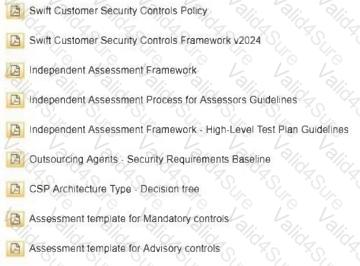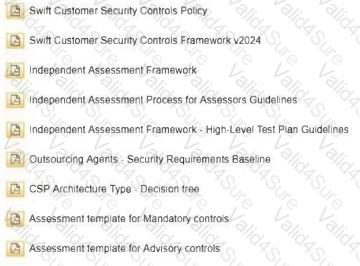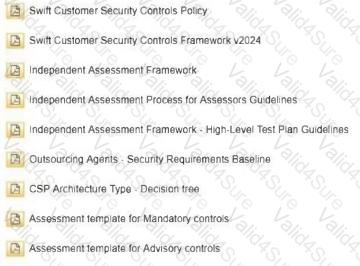- Home
- Swift
- Customer Security Programme (CSP)
- CSP-Assessor - Customer Security Programme Assessor Certification(CSPAC)
CSP-Assessor Exam Dumps - Customer Security Programme Assessor Certification(CSPAC)
For each of the following setups, the responsible party is identified to protect the virtualization or cloud underlying platform. Which one of the combinations is not correct?
•Swift Customer Security Controls Policy
•Swift Customer Security Controls Framework v2025
•Independent Assessment Framework
•Independent Assessment Process for Assessors Guidelines
•Independent Assessment Framework - High-Level Test Plan Guidelines
•Outsourcing Agents - Security Requirements Baseline v2025
•CSP Architecture Type - Decision tree
•CSP_controls_matrix_and_high_test_plan_2025
•Assessment template for Mandatory controls
•Assessment template for Advisory controls
•CSCF Assessment Completion Letter
•Swift_CSP_Assessment_Report_Template
For on-premises virtualization platform: by the platform provider
For virtualization platform deployed at a third party on which user’s SWIFT-related components are virtually hosted: by the third party
For on-premises container platform: by the SWIFT user
For Cloud Provider: the cloud provider
Answer:
Explanation:
The CSCF and "Outsourcing Agents - Security Requirements Baseline v2025" define responsibilities for securing virtualization or cloud platforms hosting SWIFT-related components. Let’s evaluate each combination:
•Option A: For on-premises virtualization platform: by the platform provider
This is not correct. An on-premises virtualization platform (e.g., VMware or Hyper-V hosting Alliance Gateway) is managed by the SWIFT user, not the platform provider (e.g., VMware). The "platform provider" supplies the software, but the user is responsible for securing the on-premises environment, including hardening, patching, and compliance with CSCF Control "2.3 System Hardening."
•Option B: For virtualization platform deployed at a third party on which user’s SWIFT-related components are virtually hosted: by the third party
This is correct. If the virtualization platform is hosted by a third party (e.g., a service provider hosting SWIFT components), the third party is responsible for securing the platform, as per the "Outsourcing Agents - Security Requirements Baseline v2025" and CSCF Control "1.1."
•Option C: For on-premises container platform: by the SWIFT user
This is correct. An on-premises container platform (e.g., Docker or Kubernetes hosting SWIFT applications) is the user’s responsibility to secure, aligning with CSCF Control "1.1" and the user’s ownership of on-premises infrastructure.
•Option D: For Cloud Provider: the cloud provider
This is correct. In a cloud model (e.g., IaaS like Alliance Cloud on AWS), the cloud provider (e.g., AWS) is responsible for securing the underlying platform, as outlined in the "Outsourcing Agents - Security Requirements Baseline v2025."
Summary of Correct Answer:
The combination that is not correct is A, as the SWIFT user, not the platform provider, is responsible for securing an on-premises virtualization platform.
References to SWIFT Customer Security Programme Documents:
•Swift Customer Security Controls Framework v2025: Control 1.1 defines responsibilities for on-premises platforms.
•Outsourcing Agents - Security Requirements Baseline v2025: Specifies third-party and cloud provider responsibilities.
•Independent Assessment Framework: Confirms user responsibility for on-premises setups.
Select the correct statement(s) about the Swift Alliance Gateway. (Choose all that apply.)

It acts as the single window to SwiftNet messaging services byconcentratingyour traffic flows
It allows sharing of PKI profiles between application or individuals, through the use of virtual profiles
It allows the creation and/or modification of some Swift messages (depending on the types &/or formats)
The Alliance Gateway can only be accessed by a SWIFTNet user
Answer:
Explanation:
The Swift Alliance Gateway is a critical component in the Swift ecosystem, designed to facilitate secure messaging and connectivity. Let’s evaluate each option based on theSwift Customer Security Controls Framework (CSCF) v2024and related documentation.
Step 1: Understand the Role of Swift Alliance Gateway
The Swift Alliance Gateway (SAG) is a software component that serves as a centralized entry point for SwiftNet messaging services. It handles traffic concentration, security, and connectivity management. This is detailed in theSwift Alliance Gateway User Guideand referenced in theCSCF v2024underControl 1.1: Swift Environment Protection.
Step 2: Evaluate Each Option
A. It acts as the single window to SwiftNet messaging services by concentrating your traffic flowsThe SAG is designed to consolidate and manage all SwiftNet traffic from a user’s environment,acting as a single point of access to SwiftNet services. This is a primary function, as confirmed in theSwift Alliance Gateway Technical Documentationand aligns withControl 1.1, which emphasizes secure traffic management.Conclusion: This statement is correct.
B. It allows sharing of PKI profiles between application or individuals, through the use of virtual profilesThe SAG supports the use of virtual PKI profiles to enable secure sharing of cryptographic identities across applications or users within the Swift environment. This feature enhances flexibility while maintaining security, as noted in theSwift Security Best PracticesandControl 2.5B: Cryptographic Key Management.Conclusion: This statement is correct.
C. It allows the creation and/or modification of some Swift messages (depending on the types &/or formats)The SAG is a gateway for message routing and security, not a tool for creating or modifying Swift messages. Message creation and modification are handled by applications like Alliance Access or Entry, not the Gateway. This is clarified in theSwift Alliance Gateway User Guide, which specifies its role as a connectivity and security layer.Conclusion: This statement is incorrect.
D. The Alliance Gateway can only be accessed by a SWIFTNet userThe SAG is accessed by authorized systems and users within the Swift user’s environment, not exclusively by SwiftNet users. It interfaces with operator systems, middleware, and other components, as perControl 1.2: Logical Access Control, which allows controlled access by authorized entities, not just SwiftNet users.Conclusion: This statement is incorrect.
Step 3: Conclusion and Verification
The verified statements areAandB, as they accurately reflect the SAG’s role in traffic concentration and PKI profile management, consistent with Swift CSP documentation.
References
Swift Alliance Gateway User Guide, Section: Functionality Overview.
Swift Customer Security Controls Framework (CSCF) v2024, Control 1.1: Swift Environment Protection, Control 2.5B: Cryptographic Key Management.
Swift Security Best Practices, Section: Alliance Gateway Configuration.
The Swift user has an sFTP server to push files to an outsourcing agent hosting the Swift users own Communication interface. What is their architecture type?

A1
B
A3
A4
Answer:
Explanation:
This question requires identifying the architecture type based on the SWIFT CSP Architecture Types (defined in CSCF documentation) for a user with an sFTP server pushing files to an outsourcing agent hosting the Communication Interface:
Step 1: Define the Scenario
The SWIFT user uses an sFTP server to transfer files to an outsourcing agent, which hosts the user’s Communication Interface (e.g., SWIFT Alliance Gateway). The Communication Interface connects to the SWIFT network.
Step 2: SWIFT Architecture Types Overview
A1: Full in-house stack (Messaging Interface, Communication Interface, etc.).
A3: Communication Interface hosted by a service provider/outsourcing agent; back-office or middleware connects to it.
A4: Both Messaging and Communication Interfaces hosted by a service provider.
B: Alliance Lite2 (direct cloud-based connectivity).
The Swift secure zone is composed of a Swift connector, a middleware server and a back office system Is the selection of only one of the above components a representative sample based on the High-Level Test Plan (HLTP) guidelines?

Yes
No
Answer:
Explanation:
The High-Level Test Plan (HLTP) guidelines, as part of the SWIFT CSP Independent Assessment Framework (IAF), provide instructions for assessing compliance with CSCF controls. The question asks whether selecting only one component (e.g., a SWIFT connector, middleware server, or back-office system) from the SWIFT secure zone is a representative sample for testing:
Step 1: Understand the SWIFT Secure Zone
The SWIFT secure zone is a segregated environment containing all SWIFT-related components critical to transaction processing, including connectors (e.g., SWIFT Alliance Gateway), middleware servers, and back-office systems (CSCF v2024, Control 1.1 –SWIFT Environment Protection). These components collectively form the "SWIFT footprint."
Step 2: HLTP Guidelines on Sampling
The HLTP requires assessors to test a "representative sample" of systems to verify compliance. However, the guidelines emphasize that the sample must cover the "full scope of the SWIFT environment" to ensure all critical components and their interactions are assessed (IAF, Section 3 – Assessment Methodology). Selecting only one component (e.g., just the connector) ignores the others (middleware and back-office), which may have different security configurations or risks.
Step 3: Application to the Scenario
In this case, the secure zone comprises three distinct components. Testing only one (e.g., the connector) would not provide a comprehensive view of the secure zone’s compliance with controls like 1.1 (environment protection), 2.1 (system hardening), or 4.2 (MFA). The HLTP expects a sample that reflects the diversity and interdependence of these components, not a single point.
Conclusion: No, selecting only one component is not a representative sample per HLTP guidelines, as it fails to address the full scope and complexity of the SWIFT secure zone.
Which statements are correct about the Alliance Access LSO and RSO? (Select the two correct answers that apply)
•Connectivity
•Generic
•Products Cloud
•Products OnPrem
•Security
They are Alliance Security Officers
Their PKI certificates are stored either on an HSM Token or on an HSM-box
They are the business profiles that can sign the SWIFT financial transactions
They are responsible for the configuration and management of the security functions in the messaging interface
Answer:
Explanation:
The Local Security Officer (LSO) and Remote Security Officer (RSO) are roles defined within the SWIFT Alliance suite, particularly for managing security in messaging interfaces like Alliance Access. Let’s evaluate each option:
•Option A: They are Alliance Security Officers
This is correct. The LSO and RSO are collectively referred to as Alliance Security Officers within the SWIFT ecosystem. The LSO is typically an on-site officer responsible for local security management, while the RSO can perform similar functions remotely, often for distributed environments. These roles are critical for configuring and maintaining security settings in Alliance Access, as outlined in SWIFT’s operational documentation. The CSCF Control "6.1 Security Awareness" emphasizes the importance of trained security officers, which aligns with the LSO/RSO roles.
•Option B: Their PKI certificates are stored either on an HSM Token or on an HSM-box
This is incorrect. While PKI certificates are used for authentication and are managed within the SWIFT environment, they are not specifically tied to the LSO or RSO roles in terms of storage. PKI certificates for SWIFTNet are stored and managed by the Hardware Security Module (HSM), either as an HSM token (e.g., a smart card) or an HSM-box (e.g., a physical or virtual HSM device). However, these certificates are associated with the SWIFT application or user roles (e.g., for message signing), not the LSO/RSO profiles themselves. The LSO/RSO uses these certificates as part of their duties, but the statement implies ownership or storage, which is inaccurate. CSCF Control "1.3 Cryptographic Failover" specifies HSM management, not LSO/RSO certificate storage.
•Option C: They are the business profiles that can sign the SWIFT financial transactions
This is incorrect. The LSO and RSO are security management roles, not business profiles authorized to sign financial transactions. Signing SWIFT financial transactions (e.g., MT103 messages) is the responsibility of authorized business users or automated processes within Alliance Access, who use PKI certificates managed by the HSM. The LSO/RSO’s role is to configure and oversee security, not to perform transactional activities. This distinction is clear in SWIFT’s role-based access control documentation.
•Option D: They are responsible for the configuration and management of the security functions in the messaging interface
This is correct. The LSO and RSO are tasked with configuring and managing security functions within Alliance Access, such as user access control, authentication settings, and compliance with CSCF requirements. This includes managing PKI certificate usage, setting up secure communication channels, and ensuring the messaging interface adheres to security policies. For example, the LSO can define security profiles and monitor access, as detailed in the Alliance Access Administration Guide, aligning with CSCF Control "2.1 Internal Data Transmission Security."
Summary of Correct Answers:
The LSO and RSO are Alliance Security Officers (A) and are responsible for the configuration and management of security functions in the messaging interface (D). Their PKI certificates are not stored by them, and they do not sign transactions.
References to SWIFT Customer Security Programme Documents:
•SWIFT Customer Security Controls Framework (CSCF) v2024: Control 6.1 highlights the role of security officers like LSO/RSO.
•SWIFT Alliance Access Documentation: Describes LSO/RSO responsibilities for security configuration.
•SWIFT Security Guidelines: Details PKI certificate management by HSM, not LSO/RSO.
========